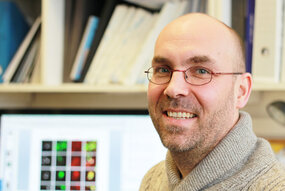Date & lieu : 14 juin 2022, 13h30, auditorium du CRBS
- Sujet : From understanding to treatment of severe forms of amyotrophic lateral sclerosis caused by mutations in the Fus gene
Abstract :
Amyotrophic lateral sclerosis (ALS) is the most frequent adult onset motor neuron disease, affecting 6 to 8000 patients in France, and leading to death within 3 to 5 years. ALS is clinically, pathologically and genetically overlapping with fronto-temporal dementia (FTD), a leading cause of dementia after Alzheimer’s disease. A subset of ALS and FTD cases are caused by monogenic mutations and mutations in the FUS gene lead to young onset and rapidly progressive forms of ALS. Interestingly, the FUS protein aggregates characterizes also a subset of FTD cases. In this seminar, I will describe how we designed and characterized knock-in models of FUS-ALS and FUS-FTD. Using these models, we showed contribution of expression of the mutation in different cell types, including motor neurons, skeletal muscle or inhibitory neurons and provided mechanistic insights into the molecular and pathophysiological consequences of FUS mutations. More recently, we used mouse genetics to provide proof of concept for possible therapeutic strategies, that are now being translated to gene therapy approaches.
Orateur :
Luc Dupuis, Directeur de recherche unité Inserm 1118, Unistra
Organisateurs :
Le comité d'animation scientifique du CRBS
Florence Allain, unité Inserm 1114/Unistra
Julie Buisson, unité Inserm 1121/Unistra
Emmanuel Darcq, unité Inserm 1114/Unistra
Valérie Jolivel, unité Inserm 1118/Unistra
Eloïse Lebaudy, unité Inserm 1121/Unistra
Naël Osmani, unité Inserm 1109/Unistra

